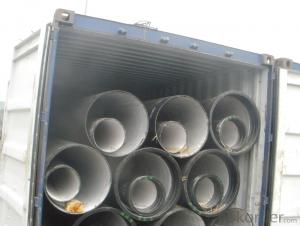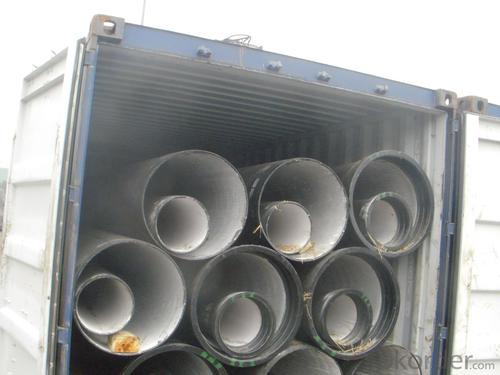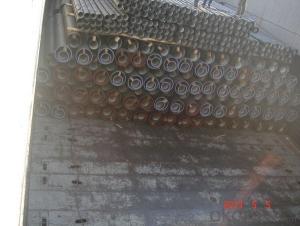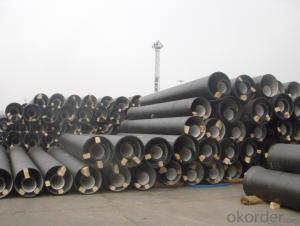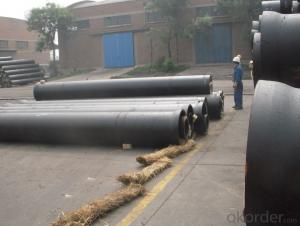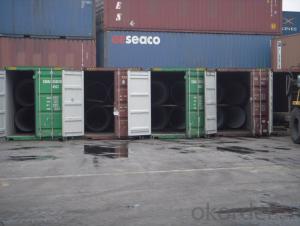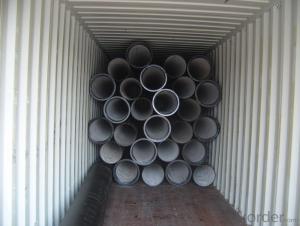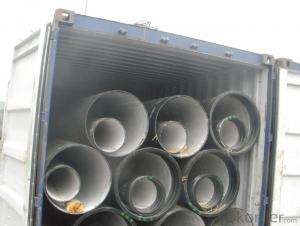DUCTILE IRON PIPE AND PIPE FITTINGS C CLASS DN1000
- Loading Port:
- Tianjin
- Payment Terms:
- TT OR LC
- Min Order Qty:
- 23 pc
- Supply Capability:
- 3000 pc/month
OKorder Service Pledge
OKorder Financial Service
You Might Also Like
· Material : Ductile Cast Iron
· Size Range : DN 80mm to DN 2000mm
· Unit Effective Length : 6m or 5.7m
· Manufacture Standard: ISO 2531:1998/ EN 545:2006/EN 598:2007
· Annual capacity : 200,000 tons
· Coating Exterior: Zinc 130g/m2 according to ISO 8179-1 and bitumen coating 70 microns.
· Cement Interior: Portland Cement/ High Alumina Cement/ Sulphate Resisting Cement Lining according to ISO 4179
· Special requirements on external coating and internal lining can be applied
· We also provide accessories such as SBR/EPDM rubber gaskets, lubricant paste, pipe caps, PE sleeves, etc.
Additional Parts:
Each pipe is strictly inspected according to related standard to ensure permanently high performance.
Easy Installation at site and service free for life
Long Service Lifespan
Quotation will arrive you within 24hours once we get your inquiry.
We guarantee offering you a competitive price.
A copy of original inspection reports of pipes will be offered after shipment.
Photos of loading process will be sent to the customer after shipment effect.
We will follow-up the delivery progress after shipment effect and update to the customer on weekly basis.
- Q: How do ductile iron pipes handle soil movement?
- Ductile iron pipes have the ability to handle soil movement well due to their flexible nature. They can withstand stress and strain caused by ground settlement, thermal expansion, and contraction, without cracking or breaking. The high tensile strength and elasticity of ductile iron allow it to adapt to shifting soil conditions, making it a reliable choice for underground installations.
- Q: How are ductile iron pipes repaired in case of damage?
- Ductile iron pipes are typically repaired through various methods such as spot repair, joint repair, or full replacement. Spot repair involves fixing small sections of the pipe by cutting out the damaged area and replacing it with a new piece. Joint repair focuses on repairing the joints between pipe sections by replacing gaskets or applying sealants. In cases of extensive damage, full pipe replacement may be necessary to ensure the integrity and longevity of the pipeline system.
- Q: What effect does magnesium play in nodular cast iron?
- The role of magnesium as spheroidizing agent used in iron spheroidizing treatment, promote water ink is made of iron, carbon in liquid iron spherical graphite precipitation.
- Q: How does ductile iron pipe perform in areas with high soil stability?
- Ductile iron pipe performs exceptionally well in areas with high soil stability. Its robust and durable nature allows it to withstand the pressures exerted by the stable soil, ensuring a reliable and long-lasting performance. Additionally, the flexibility of ductile iron allows it to accommodate ground movements and settlement without compromising its integrity. Overall, ductile iron pipe is a suitable choice for areas with high soil stability, providing efficient and dependable water distribution and sewerage systems.
- Q: What is the expected bending stress capacity of ductile iron pipes?
- The expected bending stress capacity of ductile iron pipes can vary depending on various factors such as the pipe's diameter, wall thickness, and the specific grade of ductile iron used. However, generally speaking, ductile iron pipes have a high bending stress capacity compared to other pipe materials. Ductile iron pipes are known for their high tensile strength and flexibility, making them capable of withstanding significant bending stresses. The exact bending stress capacity can be determined through rigorous testing and analysis by considering factors like the pipe's mechanical properties, dimensions, and the maximum allowable deflection. It is important to note that the bending stress capacity of ductile iron pipes should be evaluated in accordance with industry standards and guidelines. These may include standards such as the American Water Works Association (AWWA) C150 or International Organization for Standardization (ISO) 2531, which provide specifications and testing methods for ductile iron pipes. Ultimately, the expected bending stress capacity of ductile iron pipes is determined by several factors and should be assessed based on the specific requirements of the application, considering industry standards and guidelines for accurate and reliable results.
- Q: What is the typical cost of maintenance for ductile iron pipes?
- The typical cost of maintenance for ductile iron pipes can vary depending on several factors. These factors include the age and condition of the pipes, the location and accessibility of the pipes, and the specific maintenance requirements. In general, regular maintenance activities for ductile iron pipes may include cleaning and flushing to remove sediment and debris, inspecting for leaks or cracks, repairing or replacing damaged sections, and applying protective coatings to prevent corrosion. These maintenance tasks are essential to ensure the longevity and performance of the pipes. The cost of maintenance for ductile iron pipes can range from a few hundred dollars to several thousand dollars per year, depending on the extent of maintenance required. Routine maintenance activities such as cleaning and inspection may have lower associated costs, while more significant repairs or replacements can be more expensive. Additionally, the cost of maintenance can be influenced by external factors such as labor costs, materials, and contractor fees. It is crucial to consider these factors and consult with professionals or utility companies for accurate cost estimates specific to your location and situation. Overall, while the cost of maintenance for ductile iron pipes can vary, investing in regular maintenance is essential to extend the lifespan and functionality of the pipes, minimize disruptions, and prevent costly repairs or replacements in the long run.
- Q: Are there any specific standards or specifications for ductile iron pipes?
- Yes, there are specific standards and specifications for ductile iron pipes. The most widely recognized standards for ductile iron pipes include ISO 2531, EN 545, and ASTM A536. These standards outline the requirements for the material composition, physical properties, dimensions, and testing methods of ductile iron pipes. Additionally, different countries or regions may have their own specific standards or specifications for ductile iron pipes.
- Q: Can centrifugal cast iron pipe be galvanized or coated with asphalt which is good for corrosion prevention?
- 1, outdoor grounding of anti-corrosion, we must consider the contact resistance, so it is recommended not to use asphalt, and do not use anti-corrosion paint, preferably galvanized anti-corrosion.2, asphalt anti-corrosion paint has good water resistance, moisture resistance, corrosion resistance. Acid and alkali resistance, salt fog resistance, atmospheric exposure and so on. The utility model is suitable for coating internal and external surfaces of various containers and machinery, underground steel structures and underground pipelines for moisture proof, water resistance and corrosion prevention. The utility model is also suitable for repairing water cracks in houses.3, anticorrosive paint is used in the surface of the object, can be used to protect the interior of the object without corrosion of a kind of paint. It is one of the more commonly used than paint anti-corrosion paint in industrial construction, widely used in aviation, shipbuilding, chemical, oil pipelines, steel structures, bridges, oil rigs and other fields, by the vast number of manufacturers favor building.
- Q: How can the ductile iron pipe be tested?
- In the hydraulic test, the ductile iron pipe can not be close to the back, support, pipe end and so on. The inspection must be carried out after all stops
- Q: How are ductile iron pipes protected against stray current corrosion?
- Ductile iron pipes are protected against stray current corrosion through the implementation of various preventive measures and protective coatings. Stray current corrosion occurs when an electric current passes through the pipe, leading to accelerated corrosion and potential damage. To prevent this, the following measures are typically adopted: 1. Electrical isolation: Ductile iron pipes are electrically isolated from other metallic structures using insulating materials, such as rubber gaskets or non-conductive coatings. This isolation prevents the flow of stray current through the pipe, minimizing the risk of corrosion. 2. Cathodic protection: Cathodic protection is a widely used technique to protect ductile iron pipes from stray current corrosion. It involves the installation of sacrificial anodes or impressed current systems near the pipe. These anodes or systems release a controlled electric current, which counteracts the stray current and ensures that the iron pipe remains cathodically protected. 3. Coatings: Ductile iron pipes are typically coated with protective layers to enhance their resistance against corrosion. One common coating is a fusion-bonded epoxy (FBE) coating, which provides a high level of protection against stray current corrosion. FBE coatings act as a barrier, preventing the electrical contact between the pipe and the surrounding environment. 4. Monitoring and maintenance: Regular monitoring and maintenance are essential to ensure the ongoing protection of ductile iron pipes against stray current corrosion. This involves inspecting the protective coatings for any damage or degradation and promptly repairing or replacing them as needed. Additionally, monitoring systems can be installed to detect and measure stray currents, allowing for timely intervention if necessary. By implementing these protection measures, ductile iron pipes can effectively guard against stray current corrosion, prolonging their lifespan and ensuring the integrity of the pipeline infrastructure.
Send your message to us
DUCTILE IRON PIPE AND PIPE FITTINGS C CLASS DN1000
- Loading Port:
- Tianjin
- Payment Terms:
- TT OR LC
- Min Order Qty:
- 23 pc
- Supply Capability:
- 3000 pc/month
OKorder Service Pledge
OKorder Financial Service
Similar products
Hot products
Hot Searches
Related keywords
